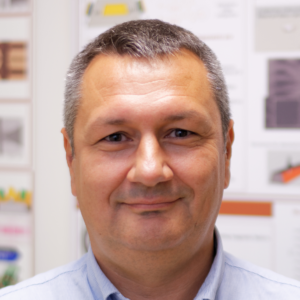Overview
The Magnetic Random Access Memories (MRAM) group develops advanced concepts in this emerging technology. The goal is to realize cells with improved thermal stability, lower power consumption and/or faster switching. Our research covers material stack deposition, nano-fabrication and electrical test evaluation, for applications as standalone memory and non-volatile logic and more recently in neuromorphic computing architectures.
Research directions
Perpendicular Anisotropy Materials
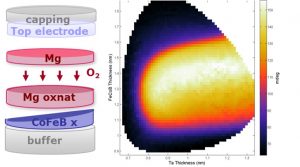
High energy barriers for spin transfer torque (STT) MRAM cells can be achieved with perpendicular anisotropy magnetic tunnel junctions. Solutions for high density MRAM cells to diameters below 20nm require continuous improvements in perpendicular surface anisotropy, while maintaining high TMR properties.
Perpendicular STT MRAM
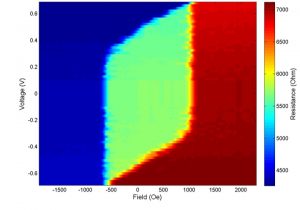
Evaluation of MRAM concepts requires simulation of expected reversal mechanisms and electrical characterization of individual cells. We aim at understanding dynamics of magnetization reversal and the expected impact of stack modifications to explore application specific optimizations.
Nanofabrication Challenges
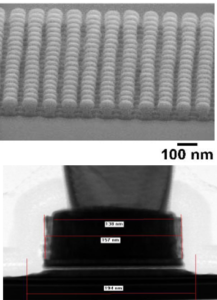
Innovation on dense MRAM using pre-patterned substrates, CMOS integration of multifunctional cells and sub-10nm lateral sizes. Tunnel junction nanofabrication in our platform is essential to evaluate MRAM concepts and performance.
Perpendicular Shape Anisotropy
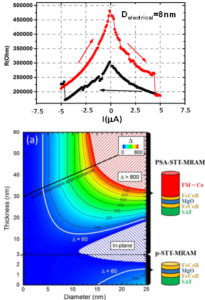
A solution for sub-10nm cell sizes uses high aspect ratios to generate perpendicular shape anisotropy providing scalable retention at the smallest cell sizes. Spin transfer torque switching is possible in these cells, where the reversal dynamics is now under study.
The team
Former members
Post-docs
- Andrey TIMOPHEEV (2014-2017)
- Van Dai NGUYEN (2016-2018)
- J. Ranier Roiz (2015-2016)
- Nikita Strelkov (2016-2019)
PhD
- Luc TILLIE (2015-2018)
- Nicolas PERRISSIN (2015-2018)
- Jyotirmoy CHATTERGEE (2014-2017)
- Hieu Tan NGUYEN (2013-2016)
- Antoine Chavent (2013-2015)
Process Engineers
- Jude GUELFFUCCI (2015-2017)
- Nathalie LAMARD (2016-2017)
- Guillaume LAVAITTE (2015-2016)
Projects
- Samsung SGMI (2014-2017)
- ANR Excalyb (2014-2017)
- Heumem (2015-2018)
- EU-FET Spice (2016-2019)
- EU Great (2016-2019)
- ERC Magical (2015-2020)
Partners
- CEA LETI, Grenoble, France
- Institut NEEL, Grenoble, France
- Crocus Technology, Grenoble, France
- Samsung, San Jose, USA
- Singulus AG, Kahl am Main, Germany
- Aarhus University, Aarhus, Denmark
- Radboud Universiteit, Neijmegen, Netherlands
Recent news
- PhD Defense – Fundamentals of ultrascaled 3D magnetic tunnel junctions and integration routes for high density memory array (September 12th, 2023)

On Friday October 13th, at 14:00, M. Nuno CACOILO will defend his PhD thesis entitled : Fundamentals of ultrascaled 3D magnetic tunnel junctions and integration routes for high density memory arrays Place : SPINTEC, CEA Building 10.05, ... - Portrait de lauréats ERC en France – Bernard Diény (August 07th, 2023)

Le ministère de l’enseignement supérieur et de la recherche a dressé le portrait de plusieurs lauréats ERC en France. Bernard Dieny, chercheur en électronique de spin à SPINTEC dans l’équipe MRAM, est l’un d’entre eux. ... - Seminar – Magnetic data storage technology; from the invention of perpendicular magnetic recording (PMR) to the social integration (July 31st, 2023)

On Monday, September 18th 2023, we have the pleasure to welcome in SPINTEC Yoichiro Tanaka from Tohoku University, Japan. He will give us a seminar at 14:00, entitled : Magnetic data storage technology; from the invention ... - Spin transfer torque based magnetic sensor and signal conditioning electronics (May 31st, 2023)

A new type of magnetic sensor based on the spin transfer torque using 50-100nm diameter perpendicular magnetic tunnel junctions was recently reported in the IEEE Sensors Journal. The paper demonstrates the magnetic field sensing principle, ... - Best poster award at INTERMAG 2023 (May 17th, 2023)

Théo FROTTIER is among Best Poster Award winners at INTERMAG 2023 Conference taking place in May 2023 in Sendai, Japan. The title of the poster prepared with Aurélie KANDAZOGLOU, Cécile GREZES of Topological Spintronics team ...









